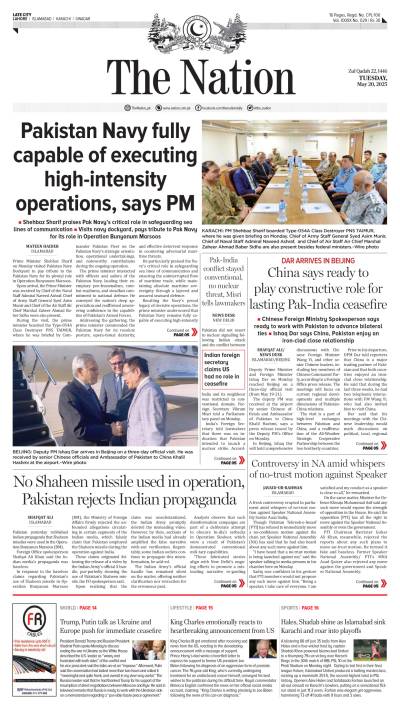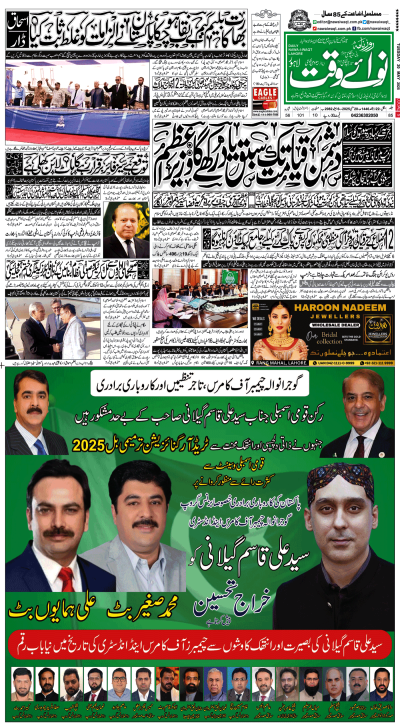Irrespective of the doubts one might have about the direction of historical forces in a particular segment of time and space, at some point one is likely to run into a situation claiming that history repeats itself. When President Barack Obama spoke from the cool of the White House, he sounded very much like Mikhail Gorbachev, when he informed the world that USA was holding peace talks with Taliban and have already completed three rounds. History is surely repeating itself. After a decade or about that time of fighting with the mujahideen, the Soviets had yielded to the diplomatic and military pressure to withdraw troops from Afghanistan and work out a peace settlement. It had dawned upon them after losing some 30,000 troops and substantial amount of military hardware that the war against the Afghans is indeed unwinnable. President George Bush was advised by many of his friends to make the same mistake that the Soviets had and avoid the Afghan traps. But the Bush administration was in a hurry to stage Tora Bora and was in no mood to listen to the comparison drawn by the US scholars and media. Some of the comparison makers went up to 17th century and dug out the war stories of Afghans vs. Mughals. In his attempt to subjugate the Afghans, Emperor Akbar the Great deployed the best of his 440,000 troops and put them under the command of his outstanding General Raja Maan Singh. According to the author of Darbar-i-Akbari, Muhammad Hussain Azad, the General fought many battles doing extensive damage to the Afghans, but failed to eliminate them. Their capability to draw the enemy into the unending rows of rugged mountains, swiftness in regrouping and sturdy make up of warriors, were some of the barriers to defeat them. So what was true about the Afghan warriors in the 17th century is also true today. The British, too, had a similar experience. Pakistan even with an extensive involvement in the complicated Soviet-Afghan negotiations was sceptic about the outcome of the talks. There are several reasons for it; most importantly, the likelihood of USA to keep Pakistan out of the negotiations. In the case of the Soviet-Afghan settlement, America played a significant role. But to Pakistans disappointment, it walked out of the arena when time for the implementation of the agreement arrived. Pakistanis believe that had not the US left the scene at a crucial moment, the Afghan refugees would have vacated their territory, the Taliban would not have emerged, and we would not be fighting the war on terror. Pakistan has repeatedly expressed the fear that its Western ally may not stay the course once it evacuated from Afghanistan. On June 23, Secretary Defence Robert Gates tried to address Pakistans fear by saying: We cannot repeat the mistakes of 1989. The fact that the US negotiators had met their Afghan counterparts three times before end of June without taking Pakistan into confidence indicates that its alliance with the US is based on a weak foundation. This shows that alliances between unequal states are without strong basis, simply because the power bigger among the two is likely to have multiple interests - some of which could be directly clashing with the major interest of the less powerful state. And when the chips are down, the interest of the more powerful state would prevail. In the light of preceding statement, one may conclude that the American and Pakistani interests tend to clash in China, Middle East, India, Iran and several other states. Also, the interests of the two countries very much clash in Afghanistan. Pakistan would surely want that the war-torn country to emerge out of the conflict, as a peaceful neighbour with no threat to its security. When Bush was assembling a government in Afghanistan after the Taliban defeat, Pakistan told the US that it does not care about the ideology of the new regime, but it does expect to have a friendly leadership in Kabul. What was true about its demand after defeat of Taliban is even more true at the time of their likely victory. Hence, resorting to talks implies that guns have failed to produce the favourable results. However, there is no harm in negotiating after a decade-long non-productive warfare. Needless to say, there are several hurdles on the way to peace. First of all, there would be need to identify the leader and influential men from the Taliban. So far, no such person has come to the limelight. To simply say, that there are good and bad Taliban, and we would talk to good Taliban, will not resolve anything. Remember, lack of identification of a unified leader cost heavily to both the main players during the Soviet-Afghan talks. The current war is, perhaps, one of the penalties for the absence of a universally accepted Afghan leader. After going through the make and break exercise several times, the friends of mujahideen were compelled to accept collective leadership in the eighties. At that point, the diversion of US attention towards disintegrating the Soviet Union left few countries in the field to help the Afghans. Consequently, the incipient government of the mujahideen broke down that led to a fratricidal war. The disillusioned Afghans sided with the Taliban, who were the only neutral force left in the field. Rest is history created by cause and effect. Another major obstruction to the progress of negotiation is ethnic Pakhtuns claim to power, because their being the largest nationality in the country. It may be recalled that the US seized power from Pakhtun Taliban, who were fighting the Northern Alliance mainly comprising Tajik and Uzbek. It would not be less than a miracle to create a coalition of the Pakhtuns and Northern Alliance. They are more likely to start the war where they had left it at the time of US intervention. Yet, another major obstacle to the success of peace talks is the attempt to keep Pakistan out of the settlement. So far, nobody has contradicted the press reports. While rest of the world capitals welcomed Obamas disclosure about resumption of Afghan peace talks, Islamabad showed its reservations over the attempt to keep it out of the Afghan settlement. As the world knows, Pakistan joined the war under US pressure. First, it was only a request for sharing intelligence and airbases. Later on, Pakistan was persuaded to make military contribution. And presently, American officials are heard saying that it is Pakistans war that the US is fighting. One may ask, if it is Pakistans war, then why it is being kept out of the peace negotiation? At this stage, many features of the war against the Soviet Union are revived. And all the parties will have to realise the impact of history before going into the new experience of nation building. The writer is author of the book, Afghanistan under Soviet Occupation. Email: hamidalvipk@yahoo.com
Wednesday, May 21, 2025
The Afghan talks - now and then
DPM Dar, Chinese FM hails all-weather strategic cooperative partnership
8:43 PM | May 20, 2025
FIA cracks down on Gujranwala passport scam, nabs 14 agents
4:44 PM | May 20, 2025
Govt reviews monsoon preparedness amid rising flood risks
4:36 PM | May 20, 2025
Ahsan Iqbal,CM Bugti discuss development projects
4:33 PM | May 20, 2025
-
Lahore emerges among safest global cities in Numbeo 2025 index
-
Lahore emerges among safest global cities in Numbeo 2025 index
-
India’s suspension of Indus Water Treaty legally baseless
-
Seventh polio case reported in Pakistan amid nationwide vaccination drive
-
Pakistan reports sixth polio case of 2025
-
PTA begins issuing VPN licences to regulate usage
The Wider War
May 20, 2025
Margalla on Fire
May 20, 2025
Defeated and Depressed
May 20, 2025
Regional Reset
May 19, 2025
Peak Potential
May 19, 2025
Worse than Anarchy
May 20, 2025
Salute to our Air Force
May 20, 2025
An Unbreakable Wall
May 20, 2025
Profiteering Milk
May 20, 2025
Rewriting the Rules
May 20, 2025
ePaper - Nawaiwaqt
Nawaiwaqt Group | Copyright © 2025





